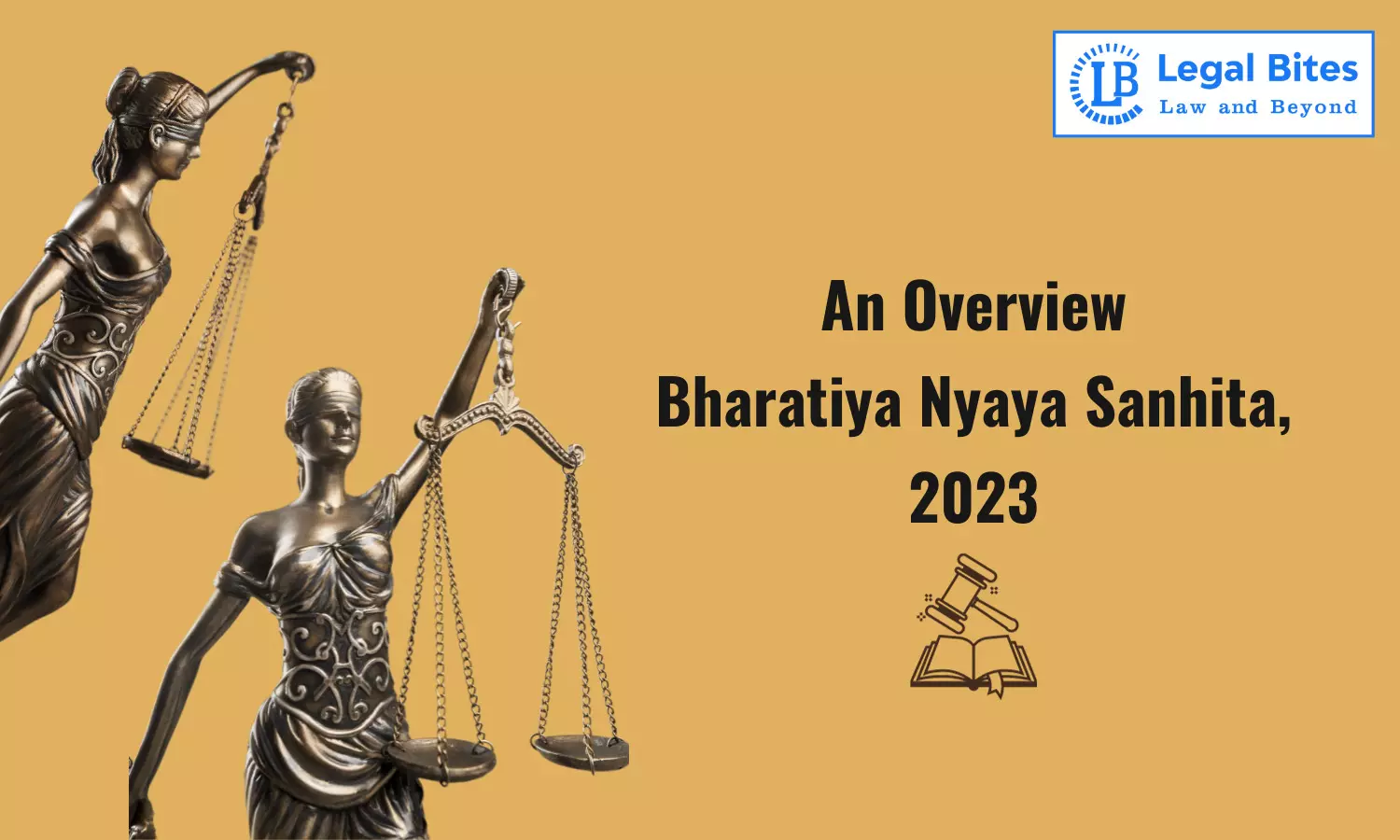An Overview of the Bharatiya Nyaya Sanhita, 2023
The article 'An Overview of the Bharatiya Nyaya Sanhita' offers a comprehensive exploration of the replacement of the Indian Penal Code.

The article 'An Overview of the Bharatiya Nyaya Sanhita' offers a comprehensive exploration of the replacement of the Indian Penal Code, highlighting the changes introduced by the new legislation, key features, and some limitations, providing valuable insights for its readers.
Introduction
The colonial-era Indian Penal Code, Code of Criminal Procedure, and Indian Evidence Act of 1872 have been replaced by the Bharatiya Nyaya Sanhita, Bharatiya Nagarik Suraksha Sanhita, and Bharatiya Sakshya Adhiniyam, marking a substitution in the realm of criminal justice. The Bharatiya Nyaya Sanhita Bill, 2023, received clearance from the Lok Sabha on December 20th and from the Rajya Sabha on December 21st.
President's Assent
On December 25, President Draupadi Murmu gave her assent for the Bharatiya Nyaya Sanhita Bill and thus it became law.
In response to the Parliamentary debate, Union Home Minister Amit Shah stated that the new bills prioritise enforcing justice over punishing. The three measures define different offences and their associated penalties to reform the criminal justice system.
It does away with sedition as a felony and adds a new section called "offences against the state" along with a precise definition of terrorism. The Bharatiya Nyaya Sanhita punishes armed rebellion, subversive operations, separatist activities, or harming sovereignty or unity.
Highlights of the Bharatiya Nyaya Sanhita
The majority of offences are kept apart from the IPC by the Bharatiya Nyaya Sanhita (BNS). Community work has been added to this as a form of punishment. Actions endangering the integrity, unity, or sovereignty of India are now considered a new crime. BNS (Bharatiya Nyaya Sanhita) includes the offence of terrorism. It is described as an act intended to intimidate the populace, disrupt public order, or jeopardise the nation's unity, integrity, and security. The list of crimes now includes organised crime. This covers crimes carried out by crime syndicates, such as kidnapping, extortion, and cybercrimes. BNS also agrees to a few decisions of the Supreme Court while incorporating new offences such as committing adultery is not an offence.
Important Points and Analyses
Mental illness: A person of unsound mind is shielded from prosecution under the IPC. This is changed to a person with mental illness by the BNS. Mental retardation is not included in the concept of mental illness, which also covers drug and alcohol abuse. The defence of mental illness can be taken in case of an offence done in an intoxicated offence. This runs counter to the IPC's general defence of intoxication, which only absolves crimes committed when involuntarily intoxicated. The use of the term 'mental illness' instead of unsound mind has been extracted from clause (a) of Section 2 of the Mental Healthcare Act, 2017.
Terrorism: The act of disturbing the public order is included in the definition of terrorism. This could result in localised breaches of peace being labelled as acts of terrorism. According to the BNS, terrorism is defined as an act that aims to spread terror among the people, by doing uncertain and violent acts disturbing public peace order. It also includes dangerous activities to cause nuisance.
Perhaps terrorism is defined too broadly:
The BNS includes the crime of terrorism. Many other offences can be labelled as acts of terrorism by adding the intent to disrupt public order to the list of terrorist offences. These might include everything from rioting and mob violence to armed rebellion and war against the government.
Age of Criminal Liability: The limitation on criminal liability is seven years. Depending on the accused's level of maturity, it can last up to 12 years. This might go against what international conventions advise.
Several offences are overlapped by specific legislation. Both frequently have distinct punishments or offer distinct processes. This could result in several regulatory frameworks, increased compliance expenses, and the potential to impose multiple fees.
Murder: Murder committed by five or more individuals based solely on identity is punishable from seven years to life imprisonment or death.
BNS omits Section 377 of IPC: Section 377 of the IPC, is not included in the BNS. This eliminates bestiality and the rape of males as crimes.
Sexual offences against women: According to the IPC, crimes against women include rape, voyeurism, stalking, and demeaning a woman's modesty. These clauses are still in the BNS. In the event of gang rape, it raises the age requirement for the victim to be considered a major from 16 to 18. Additionally, it makes it illegal to have sex with a woman while lying to her or making false promises.
Attempt to Suicide: No Longer an Offence: IPC contained Section 309 that punishes an attempt to commit suicide. But this has been removed from the Bharatiya Nyaya Sanhita.
Analyses of IPC & It's Replacement
The primary criminal law in India is the Indian Penal Code (IPC), 1860. The following types of crimes are covered: (i) assault and murder; (ii) property crimes like extortion and theft; (iii) public order crimes like rioting and unlawful assembly; (iv) crimes against public health, safety, decency, morals, and religion; (v) crimes against the state. The IPC has undergone amendments over time to add new offences, modify current ones, and alter the severity of penalties. Several offences, including consenting to sexual relations between adults of the same sex, adultery, and attempted suicide, have also been decriminalized by courts.
To create distinct penalties for sexual offences, selling kids for prostitution, adulterating food and narcotics, and desecrating holy texts, have led to the modification in the provisions of the Indian Penal Code. The IPC has been suggested to be amended on several occasions by Law Commission reports, covering topics such as food adulteration, crimes against women, and capital punishment.
The Bharatiya Nyaya Sanhita (BNS) serves as a replacement for the IPC, maintaining most IPC laws while introducing new offences and enhancing penalties for certain crimes.
Exploring the Overlaps between the Bharatiya Nyaya Sanhita (BNS) & Special Laws
Upon its enactment, the IPC included all criminal offences. To address particular topics and related offences, special laws have been passed over time. A few of these offences are no longer listed on the BNS. For instance, offences about weights and measures were taken out of the BNS and added to the Legal Metrology Act, of 2009. Additionally, the BNS includes new offences that are already covered by existing special laws, like terrorism and organised crime. Laws that overlap like this could make compliance more difficult and expensive. It might also result in different laws with different punishments for the same offences. Eliminating such offences may eliminate redundant work, potential discrepancies, and several regulatory frameworks.
Drawbacks of a Few Provisions
Preserved Facets of Sedition
Sedition was defined by the IPC as seeking to incite hatred, disdain, or discontent with the government. Sedition has been placed on hold by the Supreme Court while the Constitution bench reviews the case [S G Vombatkere v. Union of India, (Writ Petition (Civil) No 682 of 2021)]. This offence is removed by the BNS. As an alternative, it includes a clause that makes it illegal to (i) incite or seek to incite secession, armed revolt, or subversive operations; (ii) foster sentiments of separatist activity; or (iii) jeopardise India's sovereignty or unity and integrity. These offences could include using money, exchanging words or signals, or communicating electronically.
Community Service: Lacks Clarification
The BNS increases the penalty for community service. This punishment is now applicable to offences like (i) stealing property valued at less than Rs. 5,000; (ii) attempting suicide to put a public official in restraint; and (iii) showing up intoxicated and causing disturbance in a public place. The BNS neither mentions the nature nor procedures of community service. It has not given any clear aspect on the definition of what community service entails. It was suggested by the Standing Committee on Home Affairs (2023) to define the concept and parameters of "community service.”
Conclusion
As of now, there are both merits and demerits in the new legislation. But with time the government will surely take cognizance of some ignorant issues like, laws related to men, strong punishments for severe crimes, an increase in fines for petty offences, etc. It will take time for the people of India and the legal professionals to get familiar with these acts rather it will be very challenging for not only law students but also judges, lawyers, and legal professionals to adopt these changes thoroughly. Nevertheless, the outcome will likely surpass expectations and prove to be more advantageous.
Click Here to Download the Bharatiya Nyaya Sanhita
Important Links
Law Library: Notes and Study Material for LLB, LLM, Judiciary, and Entrance Exams


